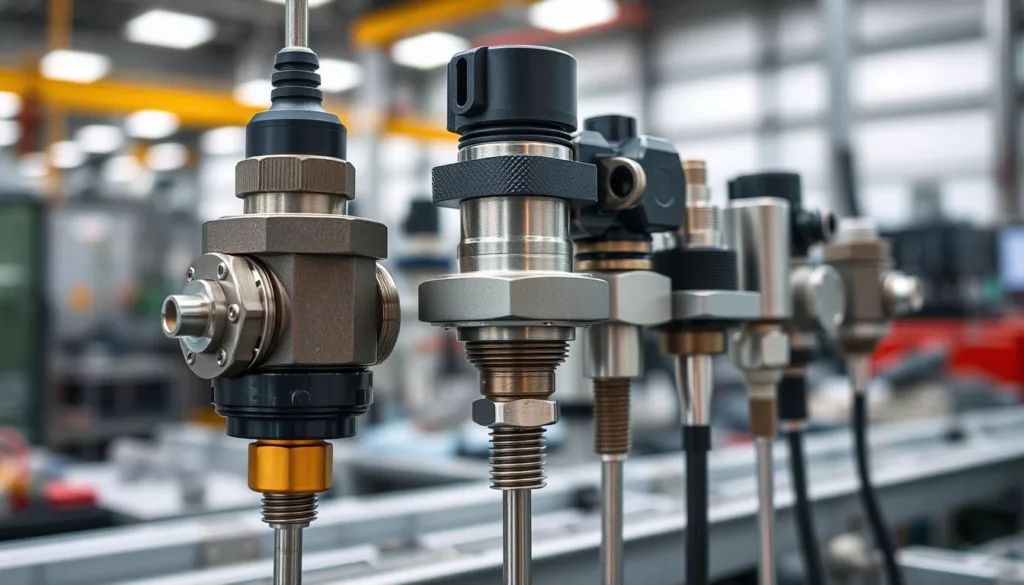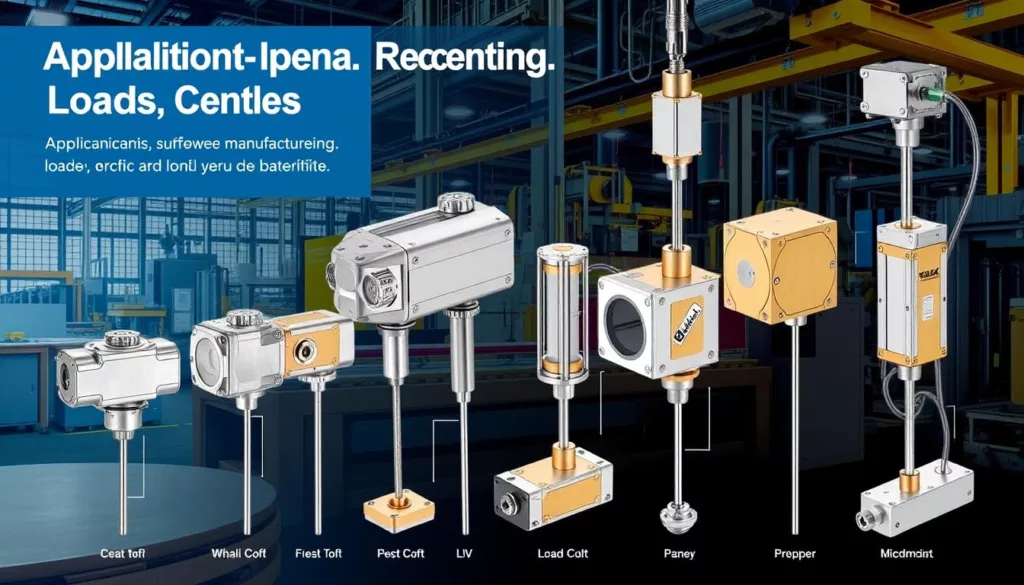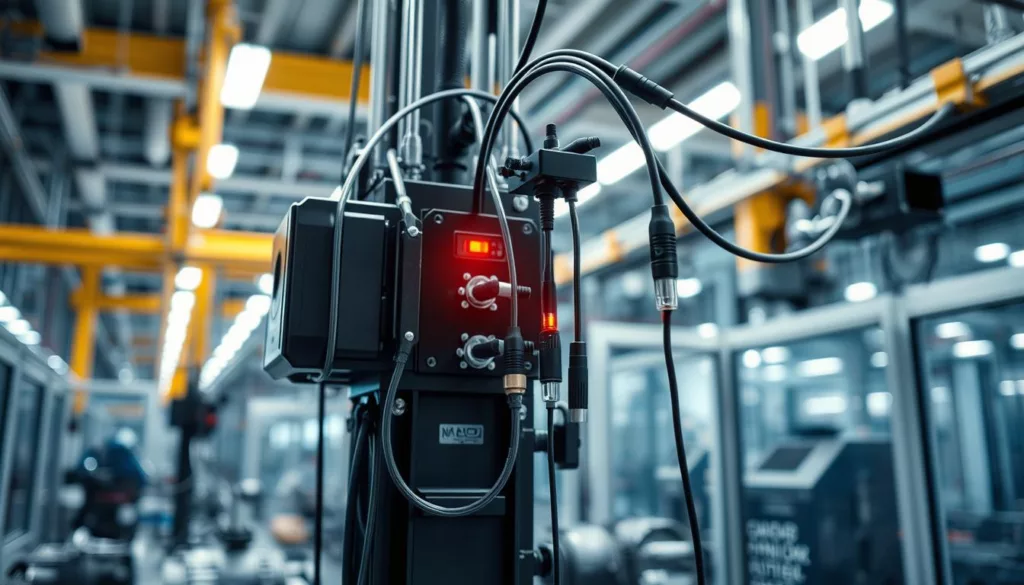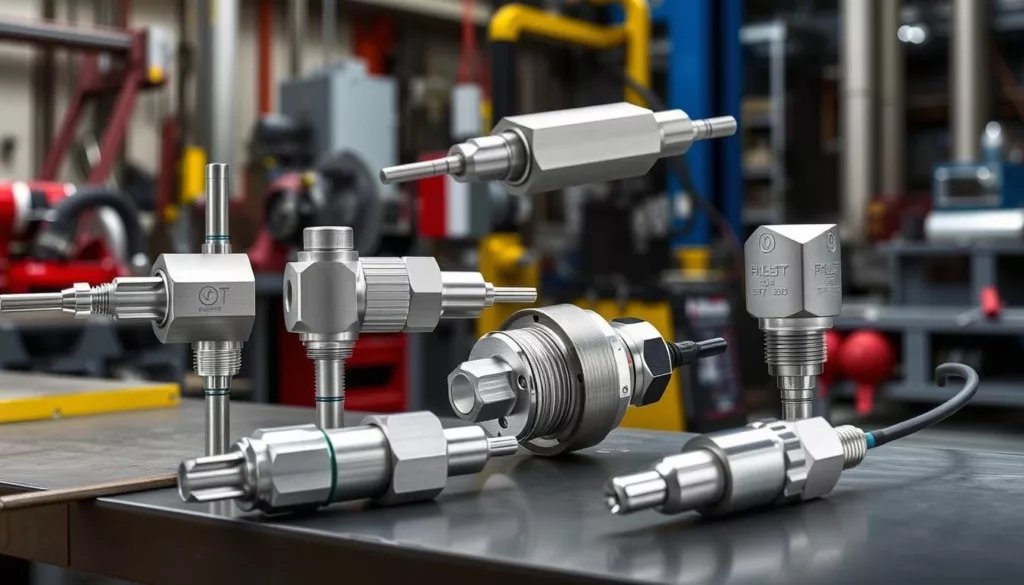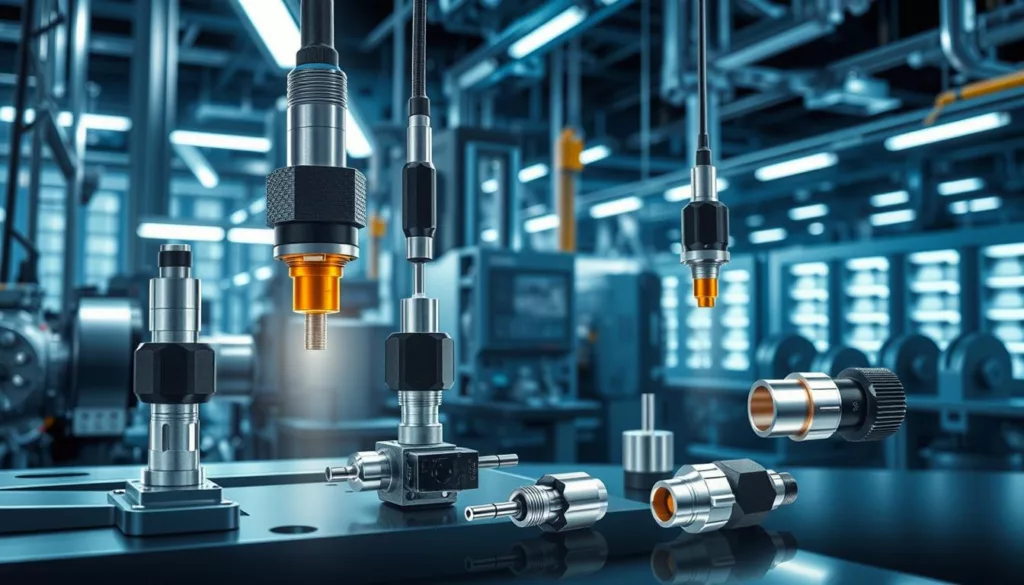In today’s fast-changing industrial world, precision, efficiency, and flexibility are key. As manufacturing gets more complex, the need for sensors that fit each industry’s needs is growing. XJCSENSOR, a top name in sensor tech, has created a wide range of tension sensors tailored for different industries.
We understand the unique challenges faced by industrial experts in many fields. Whether it’s in textile, paper, or steel production, controlling tension forces is vital. It affects product quality, efficiency, and success. By working closely with our clients, we’ve become experts in making sensors that fit their specific needs, ensuring top performance and reliability.
Key Takeaways
- Customizable tension sensors that address the unique needs of various industries
- Tailored solutions developed through close collaboration with clients
- Precision force measurement for improved production efficiency and quality
- Adaptable sensor technology to meet the evolving demands of modern manufacturing
- XJCSENSOR’s commitment to innovation and technical expertise in sensor development
Understanding the Evolution of Industrial Tension Sensing Technology
The world of industrial sensors has changed a lot over time. It has changed how factories handle tension monitoring and control. This journey has led to more precise and tailored solutions for different industries.
Historical Development of Tension Measurement
Tension measurement in factories has a rich history. At first, simple mechanical tools like springs and levers were used. Later, electronic sensors like strain gauges and load cells came along, making measurements more accurate and reliable.
Modern Advancements in Sensor Technology
In recent years, there have been big leaps in sensor technology. Customizable tension sensors now have better accuracy, last longer, and are more flexible. These improvements help factories make products better and work more efficiently.
Impact of Industry 4.0 on Sensor Development
Industry 4.0 and the Industrial Internet of Things (IIoT) have sped up sensor technology’s growth. Smart, connected sensors now help factories monitor and maintain equipment in real-time. This leads to better control over tension, saving costs, boosting productivity, and making operations more reliable.
“The advancements in industrial sensor technology have transformed the way manufacturers approach tension control, enabling them to achieve new levels of precision, efficiency, and cost-effectiveness.”
As the industrial world keeps changing, tension sensing technology will be key. It will help drive innovation and improve how factories work.
Key Components of Customizable Tension Sensors
The versatility of tailored force measurement solutions comes from the detailed parts of customizable tension sensors. These sensors adjust to the special needs of different industries. They do this thanks to their adaptable sensor technology. Let’s look at the main parts that help them work well for specific uses.
Sensing Elements
The core of a customizable tension sensor is its sensing element. It can be made to fit the exact needs of a certain application. This includes things like strain gauges, piezoelectric crystals, or magnetostrictive transducers. Each has its own strengths and how it works.
Signal Conditioning Circuits
The sensor’s signal conditioning circuits are key. They take the raw data from the sensing element and turn it into a signal we can use. These circuits can be changed to fit the needs of the application. This ensures the tension measurements are accurate and reliable.
Output Interfaces
The output interface of a customizable tension sensor sends the processed data to the monitoring or control system. These interfaces can be made to work with many communication protocols. This makes it easy to fit the sensor into any industrial setup.
| Component | Customization Options | Benefit |
|---|---|---|
| Sensing Element | Strain gauges, piezoelectric crystals, magnetostrictive transducers | Tailored to specific load and tension monitoring needs |
| Signal Conditioning Circuits | Scaling, filtering, amplification | Ensures accurate and reliable tension measurements |
| Output Interfaces | Analog voltage/current, digital bus, wireless transmission | Seamless integration into the desired industrial ecosystem |
By picking and setting up these key parts, application-specific load cells can be made to fit the needs of many industries. This shows the power of adaptable sensor technology.
Benefits of Application-Specific Load Cells in Manufacturing
In the fast-changing world of manufacturing, application-specific load cells are making a big difference. These tailored sensors are changing how we make things, making production better, cheaper, and more reliable. They help control tension and sense forces in new ways, leading to better performance and efficiency.
Improved Production Efficiency
Using application-specific load cells helps manufacturers fine-tune their work. They cut down on downtime and boost output. These sensors watch over key tension points, helping workers spot and fix problems fast. This means more products made right, less waste, and better quality.
Cost Reduction Through Precision Control
These load cells help save money by controlling tension precisely. They cut down on material waste, reduce the need for fixing mistakes, and lower energy use. They also let manufacturers plan maintenance better, saving more money.
Enhanced Product Quality Management
With precision tension control solutions and flexible force sensing systems, manufacturers can improve quality checks. These sensors give detailed insights into the making process. They help spot and fix quality problems early, leading to happier customers and a stronger brand.
Using application-specific load cells is now key for manufacturers. They bring real benefits in making more, spending less, and making better products. As we keep using these advanced sensors, we’ll see even more improvements in the future.
Implementing Bespoke Tension Monitoring Systems
The need for custom sensor solutions is rising in the industrial world. Bespoke tension monitoring systems are key for manufacturers and engineers. They help improve operations, product quality, and cut costs.
Setting up a bespoke tension monitoring system involves several steps:
- Assess Industry-Specific Requirements: Look closely at your industry’s unique needs and challenges. This helps choose the right sensor setup and features.
- Design the Customized Solution: Work with sensor experts to create a system that meets your specific needs. Consider sensor placement, data integration, and user interface.
- Integrate the System Seamlessly: Make sure the system fits smoothly into your current setup. Work with your operations team to avoid any hiccups.
- Optimize Performance and Maintenance: Create a detailed maintenance plan. This includes regular checks and updates to keep your system reliable and accurate.
By taking these steps, manufacturers can fully benefit from customizable tension sensors and industrial sensor customization. This leads to bespoke tension monitoring solutions that fit their unique needs.
“Implementing a bespoke tension monitoring system has been a game-changer for our production efficiency and product quality. The level of customization and integration has been invaluable.”
Customizable Tension Sensors for Unique Industry Needs: A Guide
At [XJCSENSOR](https://www.xjcsensor.com/force-sensor-manufacturer-for-industrial-applications/), we know each industry has special needs for tension measurement. That’s why we’ve made a guide to help you find the right customizable tension sensors for your needs.
Identifying Industry-Specific Requirements
The first step is to figure out what your industry needs. Whether it’s textile manufacturing or paper production, each has its own challenges. Our experts will work with you to create a sensor that meets your needs.
Customization Parameters and Options
After understanding your needs, we can look at the customization parameters and options. This includes changing the sensor’s size, shape, and how it’s mounted. We also choose the right sensing technology for the best performance. Our adaptable sensor technology lets us make a solution that fits your exact needs.
Integration Considerations
It’s important for the custom tension monitoring system to integrate smoothly. Our team will help ensure it works well with your setup. We consider things like compatibility and data communication. We aim to make the transition to a tailored force measurement solution easy for you.
| Customization Parameter | Options |
|---|---|
| Sensing Technology | Strain Gauge, Piezoelectric, Capacitive |
| Sensor Size and Shape | Compact, Miniature, Custom Dimensions |
| Mounting Configuration | Inline, Flange, Threaded, Custom Mounting |
| Output Signal | Analog, Digital, Fieldbus Protocols |
At [XJCSENSOR](https://www.xjcsensor.com/force-sensor-manufacturer-for-industrial-applications/), we focus on meeting your unique industry needs. Contact us to learn how we can help you find the perfect customized tension sensor.
“With their expertise in tailored force measurement and commitment to innovation, [XJCSENSOR](https://www.xjcsensor.com/force-sensor-manufacturer-for-industrial-applications/) has been an invaluable partner in helping us optimize our manufacturing processes.”
– John Doe, Production Manager, ABC Industries
Advanced Features of Tailored Force Measurement Solutions
In the world of industrial automation, tailored force measurement solutions are changing the game. They offer more than just tension sensing. They bring advanced features that boost precision, flexibility, and efficiency in many industries.
Customizable force measurement solutions are great at analyzing data in real-time. They use advanced sensors and microprocessors. This means they can give instant insights into production, helping operators make quick decisions and improve performance.
These precision tension control solutions also have wireless connectivity. This makes data transfer easy and lets people monitor things remotely. It’s a big change for manufacturers, helping them stay connected and control their systems better.
Another cool feature is adaptive calibration. These systems can adjust themselves to changes in the environment or production needs. This ensures they keep giving reliable measurements, no matter what’s happening in the factory.
“The advanced features of our customized force measurement solutions have transformed the way our clients approach tension control and monitoring. By seamlessly integrating cutting-edge sensor technology and data analytics, we enable them to achieve new levels of precision, efficiency, and agility in their operations.”
XJCSENSOR is leading the way in tailored force measurement. They keep improving their products to meet the changing needs of industries. This includes textile and steel processing.
Industry Applications and Case Studies
At XJCSENSOR, we’ve seen how our customizable tension sensors change industries. They help in textile, paper, and steel production. Our sensors bring amazing results. Let’s look at some case studies that show our sensors’ power.
Textile Manufacturing
In the textile world, small changes in tension matter a lot. Our sensors are key for our clients. A top textile maker had trouble with tension control. They used our sensors and saw a 25% drop in waste and rework.
Paper Production
The paper industry needs high quality and our sensors help. A big paper mill had trouble with tension. They used our sensors and saw a 15% boost in efficiency and 10% less energy use.
Steel Processing
The steel industry needs precise control and our sensors deliver. A major steel plant wanted better control and less waste. They used our sensors and saw a 20% increase in output and 12% less scrap.
These examples show how XJCSENSOR’s sensors help our clients. They solve big problems and make things better. Our technology boosts productivity, quality, and saves money.
Maintenance and Calibration of Custom Tension Sensors
Keeping your precision tension control solutions in top shape is key. At XJCSENSOR, our experts know how important it is. They help you get the best out of your adaptable sensor technology and flexible force sensing systems.
Routine Maintenance Procedures
Here are some steps to keep your custom tension sensors working well:
- Check sensor parts for wear or damage regularly
- Clean the sensor surfaces and connections to avoid debris buildup
- Make sure the sensor electronics and connections work right
- Ensure the sensor is mounted and aligned correctly
Calibration and Troubleshooting
Calibration keeps your sensors accurate and consistent. Our team can help with how often and how to calibrate. We also offer troubleshooting to fix any issues, keeping your precision tension control solutions running smoothly.
| Calibration Interval | Recommended Practices | Troubleshooting Tips |
|---|---|---|
| Quarterly |
|
|
| Annually |
|
|
By following these steps, you’ll keep your precision tension control solutions reliable and accurate. This will make your adaptable sensor technology and flexible force sensing systems work better and last longer.
“Proper maintenance and calibration are essential for maintaining the precision and reliability of custom tension sensors. XJCSENSOR’s expert guidance helps our customers optimize the performance of their flexible force sensing systems for the long term.”
Future Trends in Adaptable Sensor Technology
The demand for adaptable sensor technology and customizable tension sensors is expected to skyrocket. Experts say the future of flexible force sensing systems will be influenced by new technologies and industry changes.
Emerging Technologies
The sensor industry is seeing a big trend: the use of artificial intelligence (AI) in sensors. AI will help analyze data in real-time and predict when maintenance is needed. This will make automated systems more efficient and quick to respond.
The Internet of Things (IoT) is also becoming more popular. It will make it easier to connect customizable tension sensors to other industrial systems. This will give companies better control and visibility over their production processes.
Predicted Industry Developments
- More demand for flexible force sensing systems that can adjust to changing needs and conditions
- Focus on making sensors smaller and wireless to save space and improve mobility
- Improvements in materials science for more durable, sensitive, and affordable sensors
- Using sensors in more areas, like healthcare, renewable energy, and transportation
The future of adaptable sensor technology and customizable tension sensors looks bright. It promises better precision, efficiency, and flexibility for businesses looking to lead the way.
“The integration of advanced sensor technologies will be a key driver of Industry 4.0, enabling manufacturers to enhance productivity, quality, and responsiveness across their operations.”
Cost-Benefit Analysis of Custom Sensor Solutions
Customizable tension monitoring systems or tailored force measurement solutions need an initial investment. But, the long-term benefits can be much greater than the upfront costs. By looking at the cost-benefit ratio, leaders can make smart choices that fit their needs and budget.
One big plus of bespoke sensor solutions is how they boost production efficiency. They offer precise control and real-time data. This helps spot and fix problems early, avoiding costly downtime.
Also, the better product quality from these load cells can really help a company’s profits. Improved quality control and fine-tuned manufacturing can cut down on waste. This leads to happier customers and might even bring in more money through premium products.

